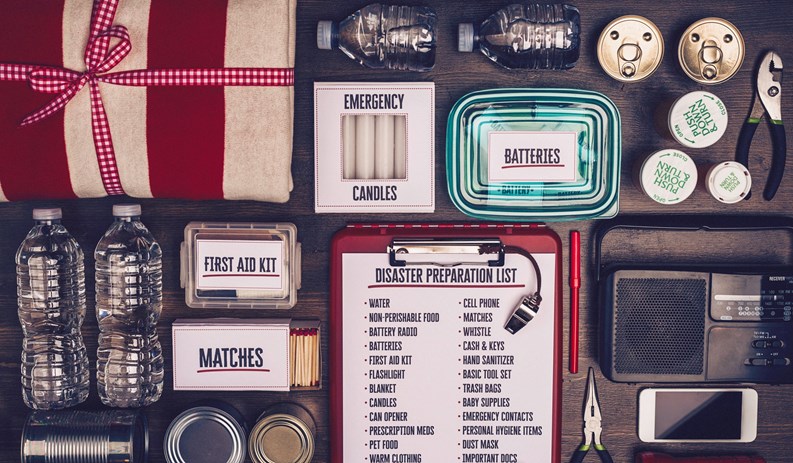Planning for a rainy day is pretty easy. Have an extra umbrella handy, or a waterproof coat, and you’re probably fine. On the other hand, planning for the rainiest day ever is significantly more daunting – especially if during the deluge there’s also a fire, an earthquake, or a tornado. But these are possibilities that every community association must face in order to ensure that residents can weather any storm – literal or figurative. Protecting lives – and property value – to the best of its ability is the duty of every board, and that’s why an association should have a plan ready in the event of an emergency.
Better Safe Than Sorry
In some places, including Florida, statute doesn’t dictate exactly what an association must plan for when it comes to emergencies. Of course, this doesn’t give a board carte blanche to kick back and wish bad weather away; a board still has a fiduciary duty to protect its property and residents.
“While there’s no statutory requirement for either condominium or HOA to have an emergency disaster plan,” says Joshua Gerstin of Boca Raton-based law firm Gerstin & Associates, “pursuant to Florida’s Condominium Act and its Homeowners Association Act, a community association’s primary role is to protect and maintain the common areas and operate the association for the health, safety, comfort, and general welfare of the unit owners. Implied within that statutory role is protecting the common areas, owners and equipment from disasters. Although an emergency disaster plan is not required by law, should something go awry during an emergency that could have been avoided, or the damage mitigated, the lack of a coherent emergency disaster plan could be considered when determining whether the association acted negligently.”
So it’s in the association’s best interests to be ready for an emergency, even if the law isn’t breathing down its back. Shari Wald Garrett, an associate at the law firm of Siegfried, Rivera, Hyman, Lerner, De La Torre, Mars, and Sobel, P.A., which has offices in Plantation, Coral Gables and West Palm Beach, offers the following suggestions to associations, noting that these are not all-inclusive:
• create an emergency to-do list and a preparedness plan
• maintain a roster of residents, bank information and staff information, including names, addresses and phone numbers
• maintain keys to each unit
• have copies of the wind, flood and property insurance policies digitally, as well as in water-proof containers
• photograph/take video of the interiors and exteriors of the property and common areas
• collect emergency supplies in event of an emergency, including flashlights, batteries, radios, water and non-perishables
• review the insurance deductible to determine whether the association has necessary funds on hand, or if it has to plan to obtain some, in event of an emergency
• verify emergency evacuation routes
• prior to a storm, contact vendors to take precautionary measures, such as cutting down trees, clearing debris, securing common elements, and shuttering windows/doors
• plan for water and electric shut-off times and furniture storage
• assign a communications facilitator to keep residents updated and informed, possibly via association website or text messaging
• know which residents will remain on the property during the emergency
• encourage all residents to stay informed
Managing Hysteria
Volunteer board members are most likely not experts in evacuating a large property or community – but they’re not expected to be. Fortunately, they can lean on management and other outside crisis experts for guidance to ensure that they’re prepared to handle an unexpected and dangerous situation to the best of their abilities.
“Emergencies by definition strike quickly and without warning,” says Nicholas J. Harris Jr., Vice President at Realty Performance Group in Rochester, New York. “Knowing what to do ahead of time is both your best protection and your responsibility, so it’s important that management be involved from the outset, working directly with a board to create, implement and update a plan. This plan should also be formulated in cooperation with police and fire department officials, disaster recovery contractors, outside service contractors, community service agencies, and the management company’s staff. And aside from natural disasters, it must consider arson, crime, assault, theft, bomb threats, power outages, medical crises, and other spontaneous problems that may arise.”
Associations that go it alone when formulating emergency protocols are likely to miss something. Even the most thorough board is likely to overlook a potential emergency due purely to limited experience. “I’ve worked with associations that have developed plans on their own, as well as those that have worked with an independent consultant,” says Christopher R. Lanni, Founder and President of Secure Residential Services in Concord, Massachusetts. “Some of the associations that do things themselves have success pulling their resources together and utilizing what’s available. But those that utilize an independent consultant – someone neutral, with a fresh set of eyes – tend to end up with a more robust plan, with richer detail. And it’s mostly a one-time expense; typically I’ll tell boards to allocate a few dollars in the budget every few years, just to go in and do some refreshing after examining what’s changed in regard to property alterations or demographics.”
There are certain items that a board should encourage their residents to have on-hand and readily accessible at all times. Harris recommends keeping a three-to four-day-day supply of water and non-perishable foods; extra clothing and blankets; first-aid kits; prescription medications; flashlights; battery-operated radios; extra car keys; cash; credit cards; and various necessities for infants and the elderly. He also recommends that families identify a meeting location in the event that they’re separated, and that they keep written contact information in waterproof and/or fireproof containers should cellular service be unavailable.
There are myriad resources to which a board can turn to ensure that its emergency plan is up to snuff. Lanni recommends several, including NEDRIX, the Northeast Disaster Recovery Information X-Change; ASIS International, a security professionals organization with a disaster planning group; and IAPSC, the International Association of Professional Security Consultants. “I’d just caution against adapting another building’s plan,” Lanni warns. “A good plan is pretty tailored to your specific address.”
Chicago Fire (and Other Disasters)
In some states and cities, emergency planning isn’t just a responsible action; it’s the law. Take Chicago, for example.
“For associations in buildings over 80 feet, the City of Chicago mandates a fire emergency evacuation plan be filed with the city, per the Chicago Fire Safety Code,” explains Howard S. Dakoff, a partner in the Community Associations Practice Group of law firm Levenfeld Pearlstein LLC in Chicago. “Lower-height buildings are not required to do so, and for those, it is not common to see a fire evacuation plan adopted. Also, the fire code requires appropriate signage in buildings to advise in event of a fire.”
Liability issues factor into whether or not it is worthwhile to implement a specific plan. “We have not heard of emergency plans for floods or pandemics for our clients, as those are not required by law, and are uncommon in city high-rises,” Dakoff says. “Thus, it’s not something boards typically tackle, because choosing to not adopt a plan when it is not required by law will not equate to liability for negligence. But where an adopted emergency plan results in death or injury by residents following it, that could have potential liability if there is negligence in its contents, as determined by a court of competent jurisdiction.
“It is possible that management companies have internal policies and procedures for such contingencies but, as legal counsel, we are unaware of it,” Dakoff continues. “For example, a management company might even have an automated robo-call phone system to call unit owners in the event of an emergency. Property management, building staff, and first responders handle the actual emergency, then commonly call me to notify me of the issue, coordinate with insurance coverage issues, and communicate with affected unit-owners on occasion.”
Once clear of the disaster, an association attorney should be able to help transition everything back to normalcy. “Typically, I am the liaison between the association and the insurance carrier in coordinating storm clean-up and restoration,” says Gerstin. “During this time, unscrupulous contractors and vendors prey on nervous and confused community associations in need of immediate repairs. Therefore, I also devote a significant amount of time toward reviewing the contracts and background of contractors and other vendors which the association is considering hiring for a disaster cleanup or restoration. Throughout this process, I draft letters to the members on behalf of the association to keep them apprised of the situation.”
Regardless of whether your state or city mandates emergency planning or not, the pros all agree on the importance of planning ahead. “It can be frustrating for a board to come together and make important decisions in the wake of a disaster, especially if they’ve been ousted from their residence,” Lanni says. “That’s not the ideal time to have a conversation about insurance coverage. Having fundamental discussions well in advance of an emergency will make things significantly easier.”
Mike Odenthal is a staff writer/reporter for The South Florida Cooperator.







Leave a Comment